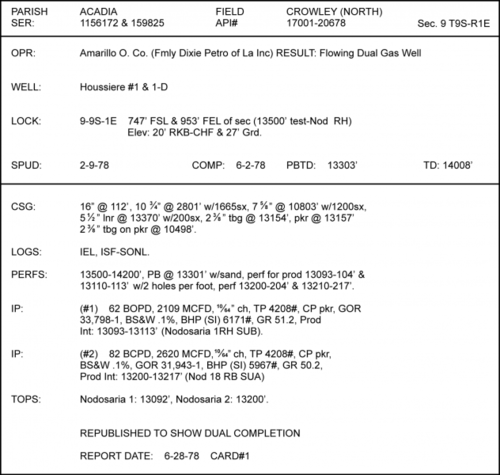Difference between revisions of "Scout ticket"
Jump to navigation
Jump to search

FWhitehurst (talk | contribs) |
Cwhitehurst (talk | contribs) |
||
| (2 intermediate revisions by one other user not shown) | |||
| Line 1: | Line 1: | ||
| − | Scout tickets are short synopses of the drilling history of a well and the results of drilling. In the past in the USA oil companies employed scouts, who watched competitors' drilling operations from a distance, and traded information with other scouts. Today most scout tickets are the written report a company must provide to the state. Some companies provide a lot of information, but others give as little as possible, and in the case of a critical well, almost none; this is called a ''tight hole''. Information that may be on a scout ticket includes location,details of drilling and casing, geologic tops, test results (such as [[drill stem testing]]),and final status. | + | [[File:Scout Ticket.png|thumb|500px|Example of a scout ticket. Source: [http://petrowiki.org petrowiki.org] ]] |
| + | |||
| + | Scout tickets are short synopses of the drilling history of a well and the results of drilling. In the past in the USA oil companies employed scouts, who watched competitors' drilling operations from a distance, and traded information with other scouts. Today most scout tickets are the written report a company must provide to the state. Some companies provide a lot of information, but others give as little as possible, and in the case of a critical well, almost none; this is called a ''tight hole''. Information that may be on a scout ticket includes location,details of drilling and casing, geologic tops, test results (such as [[drill stem testing]] and [[Overview of routine core analysis|coring]]),and final status.Information may not be reliable, especially tops and [[Determining_formation_fluid_pressure_from_DSTs#DST_pressures_from_scout_tickets|pressures]]. | ||
Latest revision as of 14:18, 4 January 2017

Example of a scout ticket. Source: petrowiki.org
Scout tickets are short synopses of the drilling history of a well and the results of drilling. In the past in the USA oil companies employed scouts, who watched competitors' drilling operations from a distance, and traded information with other scouts. Today most scout tickets are the written report a company must provide to the state. Some companies provide a lot of information, but others give as little as possible, and in the case of a critical well, almost none; this is called a tight hole. Information that may be on a scout ticket includes location,details of drilling and casing, geologic tops, test results (such as drill stem testing and coring),and final status.Information may not be reliable, especially tops and pressures.